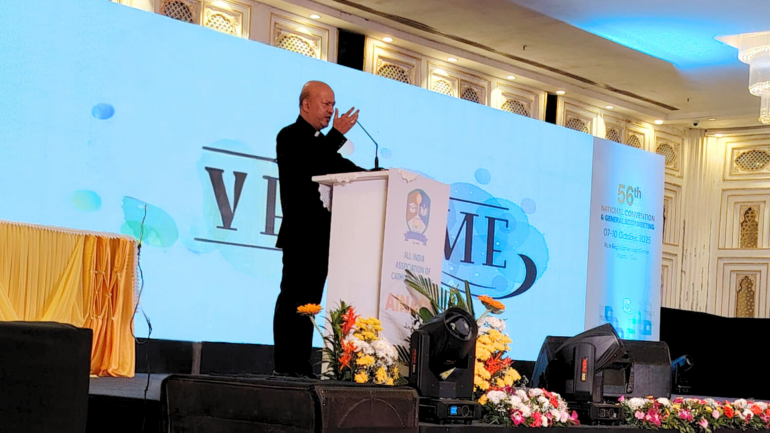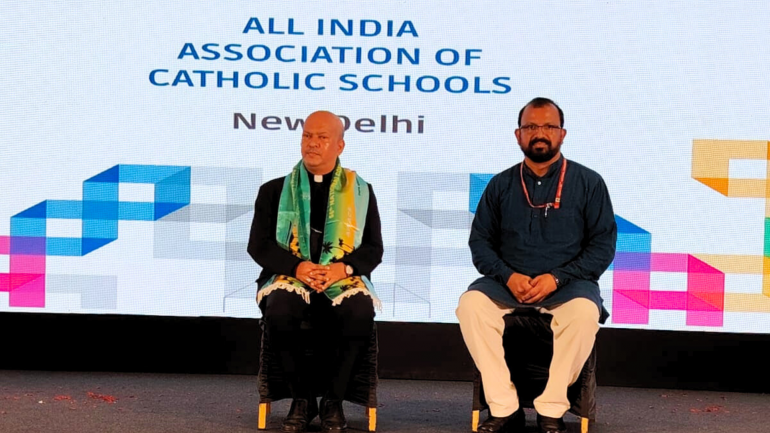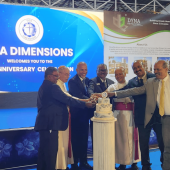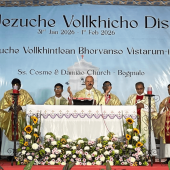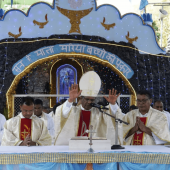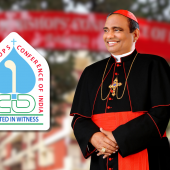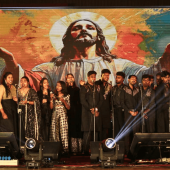Indian Prelate Calls for Synodality in Catholic Education
“Education today must rediscover its soul, the call to walk together in faith and service,” said Auxiliary Bishop Simião Fernandes of Goa and Daman, addressing the 56th Annual Convention of the All India Association of Catholic Schools (AINACS) on October 9 at the Park Regis Convention Centre, Arpora, Goa.
Conducting a session on the theme “Synodal Pathways in the Apostolate of Education,” Bishop Fernandes emphasized that schools must become “communities journeying together in search of truth,” not mere factories producing graduates. He invited Catholic educators to rediscover their mission as co-pilgrims in faith and learning, describing education as inherently synodal, “a shared pilgrimage of listening, discerning, and growing together in communion and hope.”
Unpacking the Synodal Vision
At the outset, Bishop Fernandes reflected on four key terms from the theme: Synodal, Pathways, Apostolate, and Education. “Synodality,” derived from the Greek syn-hodos (“journeying together”), speaks of accompaniment and transformation. Pathways suggest movement and direction; apostolate signifies being sent on behalf of another; and education, from the Latin educare (“to lead forth”), calls for guiding others toward truth. “There is a profound link between synodality and education,” he explained, “for both are journeys of accompaniment and transformation.”
The Emmaus Journey: A Model for Synodal Pedagogy
Reflecting on Luke 24:13–35, Bishop Fernandes pointed to the Emmaus story as a model for synodal education: “Jesus walks with the disciples, listens to their struggles, interprets the Scriptures, and transforms their sadness into joy.” This “Emmaus method, walk, listen, discern, act, is the heart of synodal pedagogy.” He reminded educators that synodality, from the early Church to Vatican II, is rooted in Communion, Participation, and Mission.
Schools as Communities of Faith and Service
Bishop Fernandes described schools as microcosms of the Church, communities where “walking together” becomes visible. Authoritarian or individualistic models, he said, no longer appeal to today’s generation. “Education is not about producing achievers but forming collaborators, peace-builders, and protagonists of change,” he stressed. It must move “from information to formation” and “from isolated roles to shared journeys.”
Amid digital disruption, pluralism, and mental health challenges, he urged the integral formation of the head, heart, hands, and hope — nurturing compassionate and discerning individuals capable of dialogue and service in a fragmented world.
PATH: A Way Forward for Synodal Education
Bishop Fernandes outlined a fourfold framework he called PATH, offering a vision for integrating synodality into education:
-
Participation – Engage students, teachers, parents, and communities in shared decision-making.
-
Accompaniment – Encourage teachers to journey alongside students, fostering their holistic growth.
-
Team Discernment – Cultivate reflection, collaboration, and ethical judgment within the learning community.
-
Hope-filled Mission – Form Christ-centered agents of transformation committed to service, justice, and dialogue.
“Education,” Bishop Fernandes reminded, “is an act of hope, and our schools must be living signs of that hope.”
Building a Culture of Communion
He proposed practical steps: foster student voice and dialogue in classrooms; encourage collaboration and spiritual discernment among teachers; build listening partnerships with parents; and engage the wider community, especially the marginalized.
Walking Together in Mission
Bishop Fernandes called for a paradigm shift, “from solo to choral, from dictating to learning, from overpowering to empowering.” “A synodal educator,” he said, “is not merely an instructor but a companion in the pilgrimage of growth and meaning.”
Concluding, he affirmed that synodality “is not an option but the very style of the Church and her schools, where truth is sought together, every voice matters, and young hearts learn not just to succeed, but to serve.”
(Br. John Malvino Alfonso, OCD, is a member of the Karnataka-Goa Province of the Order of Discalced Carmelites, based at Avila Jyothi, Mapusa, Goa, India.)
Radio Veritas Asia (RVA), a media platform of the Catholic Church, aims to share Christ. RVA started in 1969 as a continental Catholic radio station to serve Asian countries in their respective local language, thus earning the tag “the Voice of Asian Christianity.” Responding to the emerging context, RVA embraced media platforms to connect with the global Asian audience via its 21 language websites and various social media platforms.





